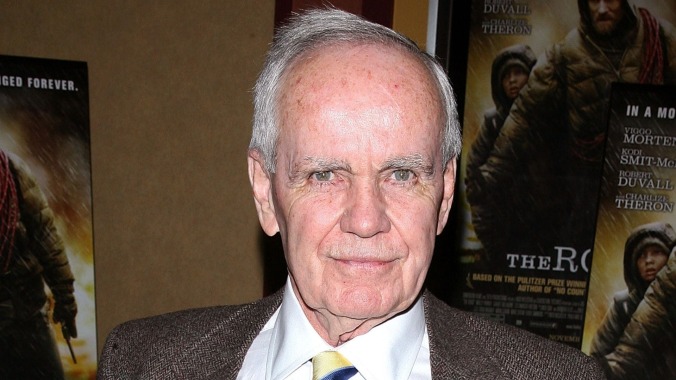R.I.P. Cormac McCarthy, Pulitzer-winning author of The Road
Cormac McCarthy, whose noted works include No Country For Old Men, Blood Meridian, and All The Pretty Horses, was 89

Cormac McCarthy, an author whose unsparing and undeniable visions of the American West and beyond inspired acclaimed motion pictures, has died of natural causes at his home in Santa Fe, New Mexico. McCarthy’s son confirmed the news via McCarthy’s publisher Penguin Random House on Tuesday. McCarthy was 89 years old.
Throughout his career, McCarthy’s great magic lay in his ability to craft incomparable prose; spare yet lyrical, needle-sharp, and unexpected. Averse to flowery language and constant quotations, McCarthy once described his style to Oprah Winfrey as relying on “simple, declarative sentences… I believe in periods, capitals, and the occasional comma. That’s it.” McCarthy’s dextrous skill in realizing violent environments populated by morally ambiguous, often grizzled characters earned him reverence, criticism, and a Pulitzer Prize for Fiction (for the unyielding 2007 post-apocalyptic novel The Road).
“Cormac McCarthy changed the course of literature,” Penguin Random House CEO Nihar Malaviya said in a statement. “For 60 years, he demonstrated an unwavering dedication to his craft and to exploring the infinite possibilities and power of the written word. Millions of readers around the world embraced his characters, his mythic themes and the intimate emotional truths he laid bare on every page in brilliant novels that will remain both timely and timeless for generations to come.”
Born in July 1933 to an Irish-Catholic family in Providence, Rhode Island, McCarthy relocated to Knoxville, Tennessee as a child, eventually attending the University of Tennessee. Released in 1965, his first novel The Orchard Keepers was critically acclaimed but barely managed to sell a thousand copies. His next four novels—1968’s Outer Dark, 1973's Child of God, 1979’s Suttree, and even 1985’s Blood Meridian or The Evening Redness in the West, an unruly masterpiece that has spent decades inching toward the big screen—didn’t catch on either. It wasn’t until 1992 that McCarthy finally achieved a bestseller (and mainstream success) with All The Pretty Horses, which was adapted into a 2001 film directed by Billy Bob Thornton and starring Matt Damon and Penelope Cruz.
Countless of McCarthy’s works beyond All The Pretty Horses have made their way onscreen. The Road was adapted into a 2009 film starring Viggo Mortensen, Child Of God became a 2013 feature starring James Franco, and a Blood Meridian adaptation is currently in the works at New Regency. McCarthy even adapted some of his own projects, turning his play The Sunset Limited into a 2011 telefilm starring Tommy Lee Jones and Samuel L. Jackson. McCarthy also penned the script for the 2013 Ridley Scott drama The Counselor, which starred Michael Fassbender, Javier Bardem, and Cameron Diaz. The project marked his first and only original screenplay.
McCarthy’s most ubiquitous work is likely his 2005 novel No Country For Old Men, which was adapted into an Oscar-winning 2007 movie starring Josh Brolin, Tommy Lee Jones, and Javier Bardem. McCarthy initially conceived of the book as a screenplay, and the characteristic succinct rhythm of his prose translates seamlessly onscreen, much thanks to the Coen brothers’ delicate and reverent adherence to the text. (The A.V. Club called the film adaptation of No Country For Old Men the gold standard for page-to-screen adaptations last year on the film’s 15th anniversary.)
McCarthy’s final two novels, The Passenger and Stella Maris, were published last year. He is survived by two sons, Cullen and John, who McCarthy previously credited as inspiring the devastating central relationship in The Road.
“A lot of the lines that are in there are verbatim conversations my son John and I had. I mean just that when I say that he’s the co-author of the book,” McCarthy told The Wall Street Journal in 2009. “John said, ‘Papa, what would you do if I died?’ I said, ‘I’d want to die, too,’ and he said, ‘So you could be with me?’ I said, ‘Yes, so I could be with you.’ Just a conversation that two guys would have.”